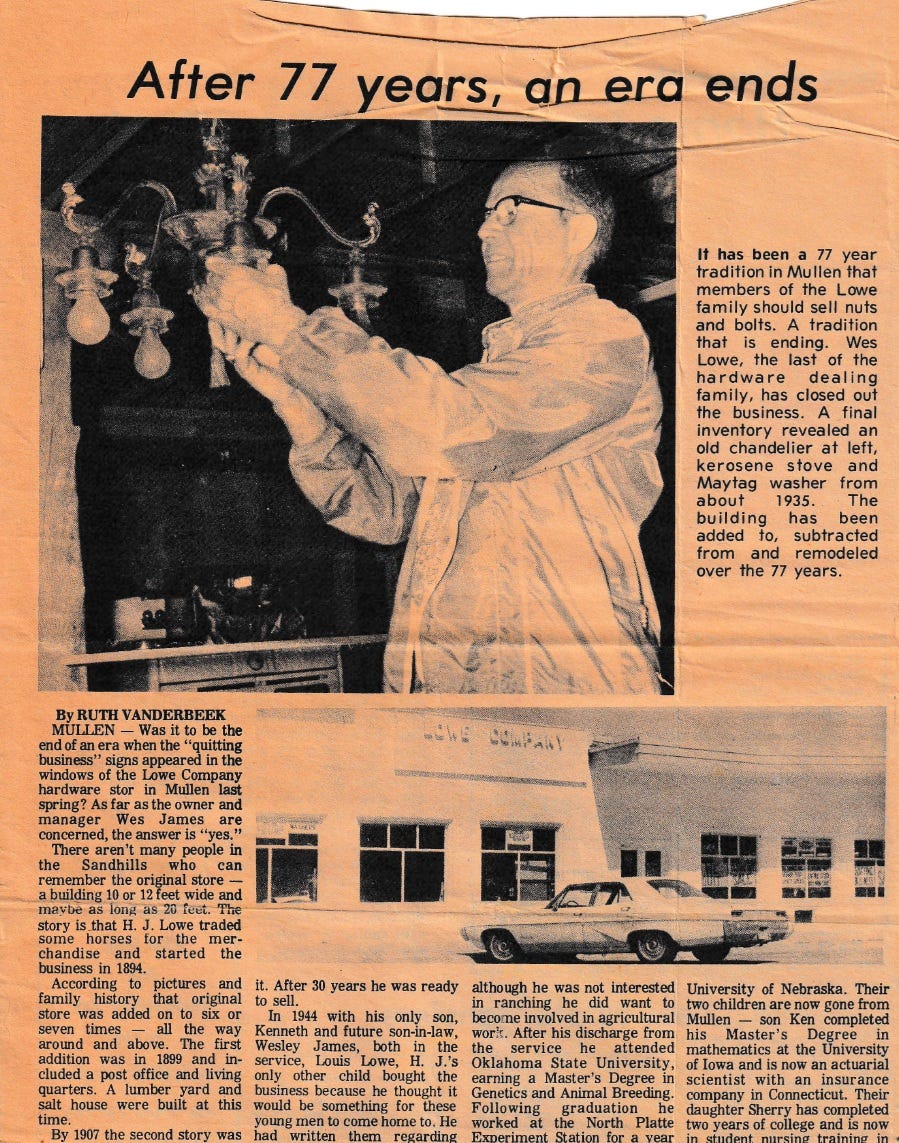Walking Away From the Mom & Pop Store
When the next generation doesn't want to take over the family business

A dear friend, Alice J., lost her husband Ken to Parkinson’s disease recently, and now she faces the herculean task of sorting through his papers. One day, Alice shared with me a creased, yellowed newspaper clipping that Ken had saved for over 50 years. The headline:
After 77 years, an era ends
It was an article written in 1971 about the closing of his family’s hardware store, located in the tiny town of Mullen, Nebraska. As the story goes, the store was started in 1894 by H.J. Lowe, who traded some horses to buy the start-up inventory.
A succession of family members put six or seven additions on the building over the years, so there were periods when the Lowe hardware store also served as a post office, a lumber yard, a salt house, a dance hall, a meeting room and a Masonic Hall.
In 1949, Ken’s dad, Wes, entered the hardware business with his father in law. Eventually Wes became the store’s sole owner, and he diligently streamlined both the building and the business over the years.
When it came time for Wes to turn over the hardware store to the next generation, he found out that neither his son Ken nor his daughter Sherry had any interest in taking over. In fact, neither of the children even lived in Mullen anymore.
For that and perhaps other reasons, Wes decided to close the business.

Did Wes resent Ken and Sherry for not stepping up? What if both Ken and Sherry had wanted to take over the business? Could the store support two growing families in Mullen? And who knows, maybe an anemic farm economy in Nebraska was the real culprit behind the store’s demise. The real back story will forever remain a mystery.
Like Ken, I had the opportunity to take over my parents’ hardware stores. But like Ken, I declined. In college, I decided that journalism was my true calling. Taking that path has rewarded me with a fascinating, fulfilling life. I believe Ken took a path that was just as fulfilling, both professionally and personally.
I felt a little guilty turning my parents down, but I don’t think my decision caused any family rifts, happily. In truth, maybe my parents wanted me to see what life was like outside of my small town in Kansas.
In 1987, my mother liquidated her store because cancer made her physically unable to run her business. In the early 2000s, my father sold his business to a couple that sold corn-fueled stoves used for heating.
Today, the buildings where Mom and Dad once operated their stores are occupied by two different small businesses. They are among the nearly 35 million small businesses in the U.S., accounting for 46% of the country’s employment, according to the Small Business Administration (SBA) in a report released last year.
A separate SBA report, also released last year, found that 27.3% of all firms in 2021 were family-owned businesses. Like other businesses, the bulk of family-owned businesses are micro businesses, with fewer than 10 employees.
Meanwhile, 88% of all farms in the U.S. are family farms, and these farms produce billions in crops every year.
One concerning trend: Between 2017 and 2021, employment by small family-owned businesses fell by 14.3% compared with a 1.3% decrease in employment for non-family small businesses. Covid likely played a role in this downturn.
The best way to support small businesses is to shop at them. Even if it means driving a few blocks out of your way, shopping local helps both families and communities. Better yet, stop by your local hardware store. If you’re lucky, it’ll have hot peanuts and coffee like my dad’s place used to have.



